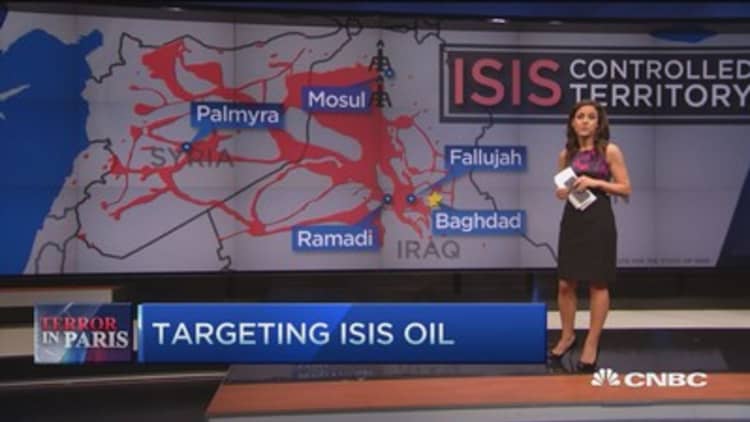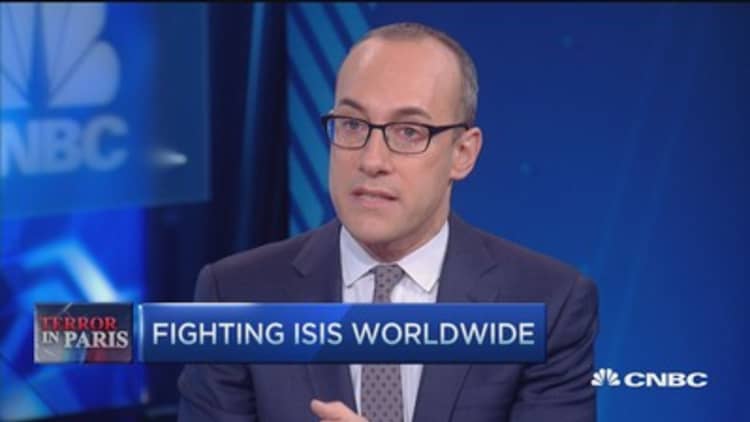


Airstrikes against positions held by the so called Islamic State have been stepped up following the terror group's attacks in Paris.
Raqqa, the group's de facto capital in Syria, was pounded Sunday by French airstrikes in retaliation for the gun and bomb attacks in Paris in which 129 people were killed. On Monday, the strikes continued as French President Francois Hollande said France was "at war" with Islamic State.
With ISIS operating in swaths of Iraq and Syria, France has called on the U.S. and Russia to join a global coalition aiming to weaken the terror group's strategic economic and military sources of strength.
Islamic State makes its money from a large range of sources — from oil, taxation and donations to criminal activities such as looting, kidnapping and ransoms — which allow it to expand its operations in a number of ways and make it harder to combat.
Based on conservative estimates from Reuters, ISIS controls assets in excess of $2 trillion, with a current annual income amounting to $2.9 billion. Fighting a wealthy foe, Western allies have a list of key targets they hope will weaken the group. Here are the main objectives:
Oil
Controlling a territory the size of the U.K., Islamic State has been able to gain control of several oilfields in parts of Syria and Iraq, allowing it to fund and maintain its military operations. As such, taking away its access to oil reserves and the revenues from these assets has become a key strategy for the U.S.-led coalition.
Accompanying the French airstrikes Monday, the U.S. stepped up its attacks on ISIS' industrial base, striking more than 116 fuel trucks used by the group to transport oil — a commodity that earns the group millions of dollars a month.
According to a statement from the U.S. Department of Defense, an ISIS "tactical unit and two fighting positions" in Syria were also destroyed. Other strikes destroyed a storage depot, tactical units and vehicles. Similar strikes were recorded in Iraq where a weapons cache and command center were also destroyed.
Read MoreCould Islamic State's 'looting economy' face defeat?
Referring to the airstrikes, an American military spokesman in Baghdad, Colonel Steve Warren, told the Wall Street Journal the purpose of the strike was to "help cripple ISIL's (Islamic State) oil distribution capabilities, which will reduce their ability to fund their military operations."
In total, ISIS controls more than 60 percent of Syria's oil production capacity and less than 10 percent of Iraq's oil production capacity, Reuters estimates. With an overall production capacity of 80,000 to 120,000 barrels per day, this represents a profit of $2 million to $4 million per day (for a barrel discounted price of $25 to $50).
Trade routes
Images of Islamic State often feature convoys of ISIS trucks and fighters holding guns and the now well-recognized ISIS black and white flag aloft. Toyota was even asked by the U.S. government to investigate why ISIS had so many of its vehicles in its processions, which are designed to display ISIS' manpower, wealth and territorial control.
Roads are an essential target for Western forces with the aim to cut off ISIS' trade routes between the towns it controls and the routes to countries it trades with. These include roads to Jordan, Iran, Kurdistan and Turkey.
The oil is also smuggled to the Syrian regime, according to reports from Reuters, a strange twist of the story given that ISIS is waging war against Syrian President Bashar Assad.
Training camps
In addition to targeting the trade routes ISIS uses, Western allies want to target the primary infrastructure the terror group has built to train fighters.
On Sunday night, French aircraft attacked ISIS' main stronghold of Raqqa in Syria. France's defense ministry said in a statement that 10 jets had dropped 20 guided bombs, targeting sites including a command center, a jihadist recruitment center, a munitions depot and a training camp.
ISIS issued a statement saying the raid targeted empty locations and there were no casualties.
Cyberwarfare
Islamic State has differentiated itself from other terrorist networks such as the Taliban and al-Qaeda with its emphasis on social media as a means to disseminate its message.
It has created a sophisticated social media presence, with high-quality videos, an English-language propaganda magazine and even a 24-hour help desk for would-be terrorists, according to media reports Monday.
ISIS' propaganda has helped it to reach disaffected young Muslims around the world, attracting foreign fighters for its cause. Western governments are now faced with struggling to prevent radicalization at home and tackling an enemy that has a large cyber footprint.
In a response to this new cyberthreat, the U.K. government announced plans to fund extra intelligence officers. On Tuesday, U.K. Chancellor George Osborne is expected to announce that the U.K. will double the funding to fight cybercrime to £1.9 billion ($2.9 billion) a year by 2020, the BBC reported.
Like other governments, the U.K. fears that future terrorism will have a digital character with hackers having the potential to gain control of the nation's energy and transport infrastructure and more.
Follow us on Twitter: @CNBCWorld



